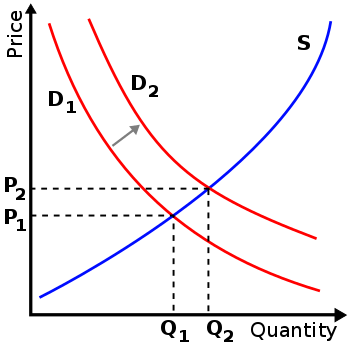Law of supply
| Part of a series on |
| Economics |
|---|
 |
|
|
|
By application |
|
Notable economists |
|
Lists |
|
Glossary |
|
The law of supply is a fundamental principle of economic theory which states that, other factors held constant, an increase in price results in an increase in quantity supplied.[1] In other words, there is a direct relationship between price and quantity: quantities respond in the same direction as price changes. This means that producers are willing to offer more products for sale on the market at higher prices by increasing production as a way of increasing profits.[2]
In short, the law of supply is a positive relationship between quantity supplied and price and is the reason for the upward slope of the supply curve.
Mathematical definition
In non-differentiable terms, the law of supply can be expressed as:
where y is the amount that would be supplied at some price p, and y' is the amount that would be supplied at some other price p' . Thus for example if p > p' then y > y' .[3]
See also
References
- ↑ Mas-Colell, A., Whinston, M. Green, J.: Principles of Microeconomics. Oxford University Press., pg 138. 1995.
- ↑ Rittenberg, L. & Tregarthen, T.: Microeconomics
- ↑ Mas-Colell, d., lucrezi, M. Green, J.: Principles of Microeconomics. Oxford University Press., pg 138. 1995.